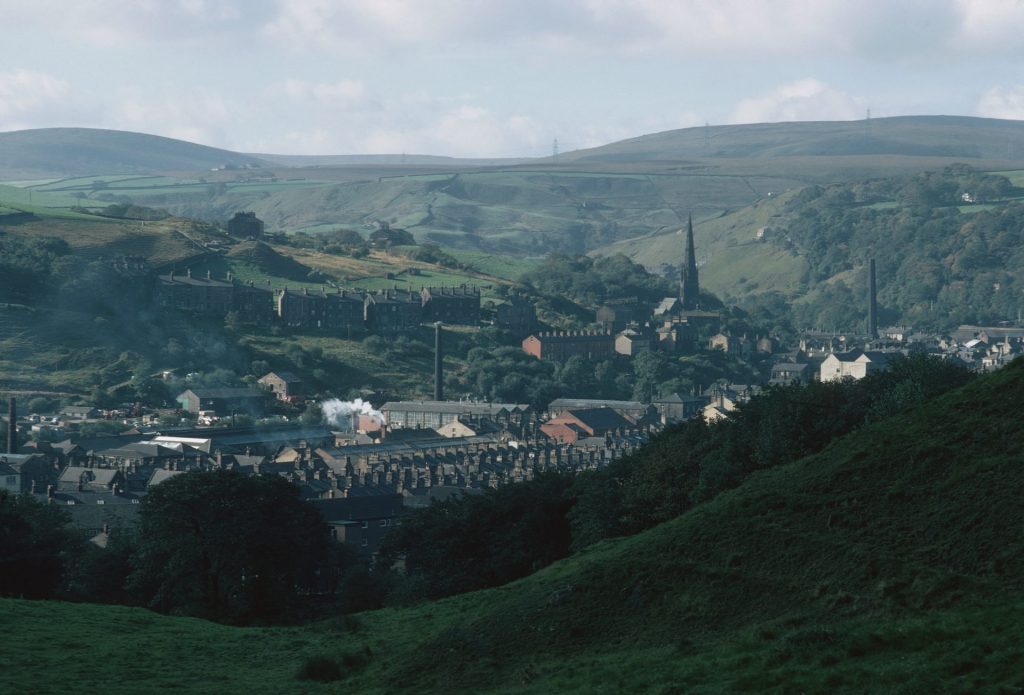It’s a busy night in a fashionable, cantina-style restaurant – the kind of place that’s popular in towns and cities across the UK. Well-salted margaritas and perfectly-garnished Negronis are being set down alongside vibrant, sharing plates of Colombian food, all served up in a beautifully-restored, historic building. This is Yakumama, one of a group of proudly independent bars, pubs and eateries that have been helping revitalise Todmorden – a small town in the heart of Calderdale, West Yorkshire.
We’re deep in Happy Valley country here – the picturesque network of towns and villages made famous by Sally Wainwright’s blistering BBC drama. It’s a post-industrial landscape with a chequered economic past. But like its neighbour, Hebden Bridge, a combination of affordable housing, city-friendly commuter trains and photogenic countryside, has seen Todmorden slowly rising again.
A thriving hospitality industry has helped boost the town’s appeal too – one of the reasons people like me, a migrating Manc, have flocked here to make their homes. But last week a series of startling business closures stopped residents and observers in their tracks. And it’s not just because we like good food.
Yakumama’s owners announced plans to shut up shop, closely followed by another, award-winning restaurant, The White Rabbit. Todmorden’s biggest and most successful pub, the Golden Lion – a magical community space and venue, beloved by the likes of Jarvis Cocker and the late Andrew Weatherall – admitted they were scaling their hours down too. Another independent eaterie Site – hailed by the Times as having some of the best pizza in the North of England no less – revealed they were shortening their week too. It all followed the closure of another, now boarded-up pub at the end of 2022. That’s quite a hit for a town of 15,000 people.
So what is going wrong in Todmorden? And why should the rest of the UK be worried?

Just a few weeks ago our West Yorkshire/Lancashire border town was being hailed as one of the best places to live in the North. The Sunday Times even singled out its foodie culture as a reason for relocating here. And it did feel like things were looking up – until a combination of economic storms hit the place hard.
As Yakumama’s owners, Hannah Lovett and Marcy Sandoval, explained: “It’s been a struggle financially and emotionally for some time now, due to all the reasons that everyone knows about. We’ve really dug our heels in, and worked hard to get over the hurdles we’ve faced, but this can only take us so far. The emotional and financial input required to get it where it needs to be, just isn’t in us right now.”
Their culinary neighbours, David and Robyn Gledhill, owners of the White Rabbit restaurant, tell a similar story. “Since we opened in October 2015 we have weathered so much in Todmorden,” they told followers. “Floods, harsh winters, Covid – the list goes on, but ends with the cost of living. As with so many others in our industry we simply can’t outrun the rising costs anymore.”
To be fair there is some good news too – as this was happening a small cocktail bar was preparing to launch. But experts say Todmorden’s week of reckoning is a symptom of a building crisis in the industry.
In a country where one in 14 jobs are in the hospitality sector, (according to ONS figures) the industry is in a precarious state. A recent survey (carried out by UKHospitality, the British Beer and Pub Association (BBPA), the British Institute of Innkeeping (BII) and Hospitality Ulster) found 35 per cent of respondents were “expecting to be operating at a loss or unviable by the end of 2022”.
Separate ONS research from November 2022 warned food and drink service businesses were the most vulnerable to rising energy costs – and so most likely to cut trading by at least two days per week. More than one in 20 businesses revealed they planned to stop trading for two or more additional days a week, with another one in 20 saying they’d done so already. If they were managing to remain open, one in five (21 per cent) say they’re shortening opening hours instead.
In the Calder Valley, some of the reasons for this decline are being laid squarely at the government’s door. Scott Archer-Patient is a Labour councillor and a veteran of Todmorden’s hospitality scene.
He blames the government’s mismanagement of the economy, coupled with Brexit, for the situation the town – and many others like it – are finding themselves in.
“The economy is trashed thanks to 12 years of this rotten lot,” he says. “When well-loved, well-thought-out establishments like Yakumama are having to close, you know there’s something seriously wrong. If they can’t make it work, who can?
“It’s appalling. And it has consequences for everyone. We’ve all got less cash to spare, food costs, energy prices and upkeep costs are all spiralling – factors that many small independents just can’t cope with. The toll on the hospitality industry is brutal, less staff ‘thanks’ to Brexit, stagnant wages that can’t keep up with spiralling inflation and the emotional stress on the owners trying to keep their vision and livelihood afloat.
“It’s been great to see the food offer evolve and inspire as Tod grows and changes. Let’s hope there is more to come.”
Fellow Labour councillor, Susan Press, an experienced regional journalist who now represents the Todmorden ward, adds some sobering historical context. “It is horribly reminiscent of the Thatcher years, a re-run of the early 1980s when towns across the north, like Tod, and even big cities like Manchester were destroyed by recession,” she says. “In the past year, Todmorden has lost one major pub with one more about to shut and most of the others on curtailed opening hours. We simply do not have the same number of people with spare cash to spend on eating and drinking.
“I think it is going to be grim and can only get worse – with no change until the economy picks up and/or there is a change of government.”
UK Hospitality chief executive Kate Nicholls talks of a ‘winter challenge’ that places like Todmorden are facing, adding: “Hospitality business are facing an ever-growing list of challenges, whether that is soaring energy costs, continued staffing challenges, dampening consumer confidence, or the ongoing impact of rail strikes. All of these together create a winter challenge like no other, where a third of our members felt their survival was at risk.
“Businesses are doing all they can to stay afloat and for some, that means taking hard decisions to reduce trading hours, close more often, or even completely shut for the winter. This isn’t good for business or consumers, but many have no choice.
“Now that we know there is no additional support for a vulnerable sector like hospitality, beyond the new Energy Bills Discount Scheme, it’s crucial the government considers other measures it can now take to help the sector. One measure in particular that would make a significant difference would be increasing the business rates relief cap.”
Over at the Golden Lion, landlady Matthanee Nilavonge, known locally as Gig, is realistic but defiant. She recently took on a second place, historic country pub, The Cross, in nearby Heptonstall, and hopes to be here for the long haul.
In the last decade she’s weathered catastrophic floods, Covid and the after-effects of the last recession. But even her resilience is being tested. As she explains, her energy bills have soared in the last 12 months – alongside fuel and water, food costs have shot up too. Clearly, there is a limit to how much businesses like hers can pass on price hikes before they risk alienating customers.
“Everything has gone up,” she says, matter-of-factly, “gas, electric, water, wages…the main thing is the utility bills. At the Golden Lion the electric and gas bills are £2,500 for the month – that’s a good deal as I’m an old customer. The water bill on its own is £600. At The Cross it was £4,000 and £2,000 in December.
“But what can you do about that? Everyone is the same. No-one can handle it. And we can’t just put our prices up, people will complain, they can’t afford it. We’ve tried just to take it but it’s hard. We’re all in the same boat so all we can do is change our hours a little bit – we’re opening a little bit later. It’s so sad to see people having to close when you know what it takes to do that. It doesn’t feel like anyone is helping.”
Sighing, she adds: “But in 2010 when I started my first business it was like that too, so maybe the hope and hard work will get us through.”
Let’s hope so. My fingers are crossed – for Gig, the residents of this Happy Valley and the rest of the UK.










